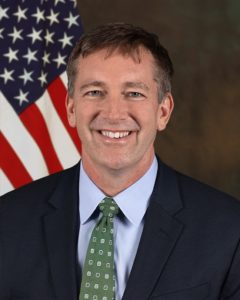
Solving the coronavirus crisis and preparing for future pandemics will be the topic of a discussion this week by Dr. Matthew Hepburn, a national leader in efforts to protect the United States from biological threats in the 21st century.
The live event, also to be streamed via Zoom, is scheduled from 3:30-5 p.m. on Friday, Dec. 10, at the Lory Student Center Grand Ballroom D. The event is sponsored by the CSU Data Science Research Institute.
About 781,000 Americans have died of COVID-19, according to the U.S. Centers for Disease Control and Prevention. Today, a new coronavirus variant, omicron, is spreading around the world, and was first detected in Colorado last week.
CSU has been at the forefront of efforts to halt the disease. The university is developing a new universal coronavirus vaccine and it developed its own coronavirus test availed by 25,000 people, with 200,000 samples collected to protect the campus community. CSU collaborated with the Colorado Department of Public Health and Environment to test workers and residents at nursing facilities. The Data Science Research Institute brings big data and analytics to bear on the problem.
“Colorado State University, and the surrounding communities, is a place where there’s lots of innovation and a can-do attitude for discovery and translating research into practical progress against contagious diseases and pandemics,” Hepburn said.
In October, Dr. Hepburn joined the White House Office of Science and Technology Policy and will manage the “American Pandemic Preparedness” agenda across the various agencies of the U.S. government
Prior, Dr. Hepburn was the vaccine development lead of Operation Warp Speed, the White House’s effort to hasten delivery of COVID-19 vaccine under the Trump administration and continued with a different name in the Biden Administration, known as the Countermeasures Acceleration Group. He is an infectious disease physician who has served in the U.S. Army Medical Corps. He has had a distinguished career in military medicine, treating patients and leading innovations to improve the health of those serving in the Department of Defense.
With his expertise in operational medicine, research and response, Dr. Hepburn served in the White House in efforts to prepare for the current pandemic, after the H1N1 influenza pandemic of 2009, helping to develop policy in detection and treatment during outbreaks. During his tenure at the Defense Advanced Research Projects Agency, Dr. Hepburn expanded diagnostic and therapeutic countermeasures, including mRNA vaccines delivered during the COVID-19 pandemic and predictive analytical tools for enhanced medical outcomes.
“The pandemic has changed everything, and a critical lesson is the importance of data to inform pandemic response on a global level and for better health care for patients. Now, we can use that data and this experience as a steppingstone to transforming health care,” Hepburn said.
Preceding his presentation, opening remarks will be delivered by President Joyce McConnell, Vice President for Research Alan Rudolph and Professor Michael Kirby of the Data Science Research Institute. A panel discussion will follow Dr. Hepburn’s presentation, likely to include:
- Chaun Powell, Premier, Inc.
- Michael Lochhead, executive vice president and chief technology officer at LightDeck Diagnostics
- Raymond Goodrich, director, CSU Infectious Disease Research Center
- Emily King, assistant professor of mathematics at CSU
- Lyle Petersen, U.S. Centers for Disease Control and Prevention
- Heather Pidcoke, chief medical research officer at OVPR and associate director of Research of Translational Medicine Institute
CSU COVID-19 protocols will be observed, and masks will be required at this event. For more information, or to register, visit: research.colostate.edu/dsri/events.
The event is free.